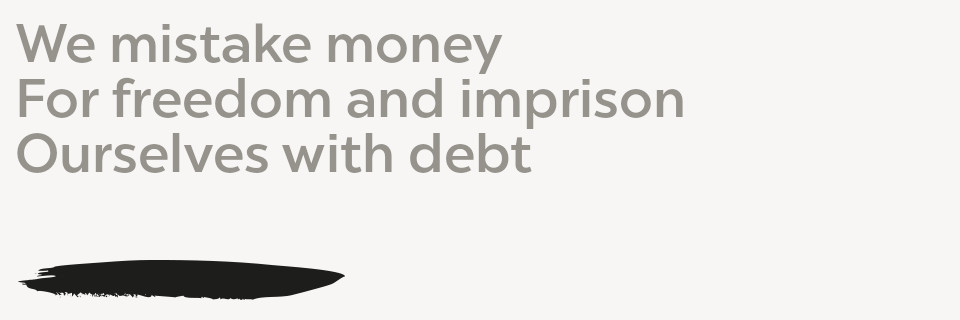Life is teaching us about money right now. Are you getting the message? Perhaps I can help translate.
We heard a lot about how many people live “paycheck-to-paycheck” in the news when COVID hit. Statistics range from 40-80% and other data back it up. In 2019, Americans carried an average of $6,124 in revolving credit card debt.
When businesses shut down, there emerged two kinds of people: people who had savings to weather the storm, and those who didn’t. Mainstream journalism cites reasons like increasing medical costs, the expenses of parenting, and compounding interest as the causes.
Notice how these all present the individual as a victim of circumstance. Those are challenges, surely, and there are certainly cases where unfortunate events cause acute financial pain.
But the real cause of financial difficulty for most people you won’t see in your news feed: the stubborn, entitled unwillingness to live in reality.
Credit card debt has always revealed this tendency. Debt, when used healthily, buys something you cannot currently afford when you have a plan to get the money and pay off the debt. Debt, when used unhealthily, buys something you cannot afford with a vague hope that one day you will.
The difference is how much the desire for instant gratification operates, and to what degree it overrides logic and responsibility–which in our society is most of the time.
Let’s look at this on a spiritual level. When you make a decision to buy something you cannot afford, without a plan, you depart reality and create your own virtual reality bubble, which is made of stories like, “I deserve this”, “I live abundantly,” and “I need it” (when you really don’t).
This is exacerbated by self-empowerment paradigms that tell us if we control our thoughts about money, it leads to more money, which is what child development psychologists call “magical thinking.”
When we create virtual reality bubbles, we invite reality to pop them, the same way a child breaking rules invites accountability. We may get away with not living in reality for a while, but eventually the system corrects itself. This is why about every few decades we have a major stock market correction that undoes the speculative bubble investors create. It happens on an economy-wide scale because the group is the sum total of its individuals.
In 2008, most people railed against Wall St. for gaming the system and packaging toxic assets as healthy ones, causing the market to crash. But what was not appreciated was that this is what most people do: they have an untruthful relationship with money and reality. Buying something you cannot afford is as much a lie as what the investment bankers did, in context: it’s just a matter of scale, cleverness, and a bit of maliciousness. The bankers deceived each other. A credit card debtor deceives themselves.
The lesson available to us all in 2008 was “Money ought to match reality,” but the statistics show we didn’t learn it. What does Life do when we don’t learn a lesson? It gets louder. So here we are.
Fundamentally, we can trace the problem back to illusions about freedom. Because most people think freedom means getting to do whatever you want (which no one can), the boundaries of living within your means seem like a problem, an obstacle to freedom.
But this is completely backward.
Living within your means is precisely the path to freedom, as evidenced by what irresponsible debt does. It’s like eating sugar. It feels great for a while, then addicts and hurts you.
To relate to money healthily, and live in reality requires processing fears around your own self-worth, distorted notions about freedom, and seeing money for what it actually is. That’s what we’ll be doing this fall, and you’re invited.
Money: From Burden to Freedom is the next, 11-week course that begins the 2020-2021 Clear and Open academic year. It launches on September 24 at 11:15 am PT and will challenge everything you think you know about money. You can buy just the course or get a lot more for less and become a member for a low monthly investment.
You will most likely finish the course with more money than you started.


